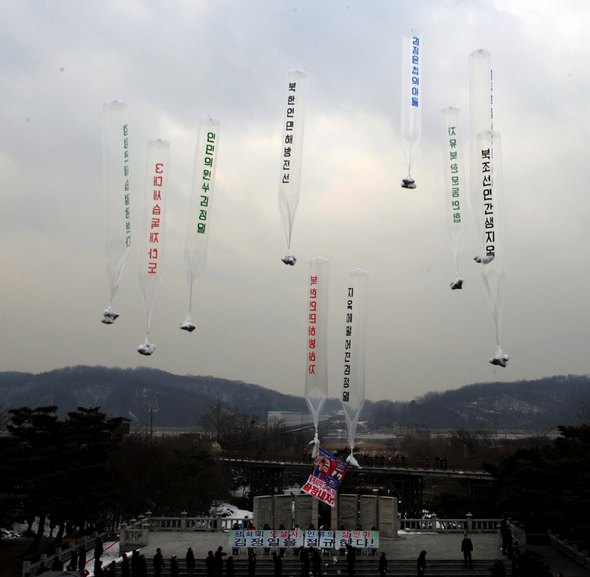hankyoreh
Links to other country sites 다른 나라 사이트 링크
N. Korea calls on South to end distribution of leaflets

By Choi Hyun-june, staff reporter
Through various channels, North Korea is issuing calls for the stop of launches of balloons filled with leaflets from the South as a precondition for inter-Korean talks. With the question of the balloons emerging as a new factor in inter-Korean relations, concerns are growing that not only high-level talks between North and South Korea but even working-level talks that are necessary for the development of the Kaesong Industrial Complex could be hobbled by the launches.
“On Sept. 11 and Sept. 14, we proposed holding a meeting of the subcommittee on traffic, communication, and access to the Kaesong Industrial Complex, but North Korea replied on Sept. 13 and Sept. 15 that meetings will not be held until the launches of anti-North Korean balloons containing leaflets are ended,” a senior Ministry of Unification official said on the morning of Sept. 16.
“On Sept. 13 and Sept. 15, North Korea’s National Defence Commission sent messages to the National Security Office at the Blue House using the military communication lines in the West [Yellow] Sea saying that the high-level talks that Seoul has proposed can only take place if leaflets are not scattered,” this official said on the afternoon of the same day.
On Sept. 13, North Korea issued a statement under the name of the spokesperson for the high-level talks stating that “ending the distribution of leaflets” was a precondition for holding high-level talks.
Over the past four days, the National Defence Commission - the most powerful body in North Korea - along with the channel for the high-level talks and the North Korean chair of the traffic subcommittee for the Kaesong Complex have all stepped forward to ask the South to refrain from scattering the leaflets.
The South Korean government maintains that it is not directly involved in distributing the leaflets. In addition, it insists that, since the balloons sent to North Korea by civic groups are protected by the freedom of expression, the government cannot intervene. In contrast, North Korea argues that South Korean military units actively cooperate with the launches and regards the Seoul government as being responsible for them.
With North Korea strongly objecting to the distribution of the leaflets, the issue could become an obstacle to inter-Korean dialogue and negotiations, given the sharp divide between Seoul and Pyongyang‘s positions on the issue. And since the North is threatening to attack the people who are launching the balloons, it could even trigger a serious confrontation. Experts say that North Korea is reacting so sensitively to the leaflets because it believes that the news about South Korea contained in the leaflets is having an increasingly significant effect on North Koreans as the economic gap between North and South widens.
The government’s belated release of information about North Korean statements is prompting suspicions about its motivations, observers say. A government official explained that it had not released the message that North Korea’s National Defence Commission sent to the Blue House because it was largely the same as the statement by the North Korean spokesperson released by the Korean Central News Agency (KCNA).
However, the fact that the National Defence Commission directly asked the Blue House to refrain from sending leaflets to the North shows that Pyongyang regards this as a very important issue. In that sense, the government’s decision not to release this information was inappropriate, observers say.
Please direct questions or comments to [english@hani.co.kr]

Editorial・opinion
![[Column] Has Korea, too, crossed the Rubicon on China? [Column] Has Korea, too, crossed the Rubicon on China?](https://flexible.img.hani.co.kr/flexible/normal/500/300/imgdb/original/2024/0419/9317135153409185.jpg) [Column] Has Korea, too, crossed the Rubicon on China?
[Column] Has Korea, too, crossed the Rubicon on China?![[Correspondent’s column] In Japan’s alliance with US, echoes of its past alliances with UK [Correspondent’s column] In Japan’s alliance with US, echoes of its past alliances with UK](https://flexible.img.hani.co.kr/flexible/normal/500/300/imgdb/original/2024/0419/2317135166563519.jpg) [Correspondent’s column] In Japan’s alliance with US, echoes of its past alliances with UK
[Correspondent’s column] In Japan’s alliance with US, echoes of its past alliances with UK- [Editorial] Does Yoon think the Korean public is wrong?
- [Editorial] As it bolsters its alliance with US, Japan must be accountable for past
- [Guest essay] Amending the Constitution is Yoon’s key to leaving office in public’s good graces
- [Editorial] 10 years on, lessons of Sewol tragedy must never be forgotten
- [Column] A death blow to Korea’s prosecutor politics
- [Correspondent’s column] The US and the end of Japanese pacifism
- [Guest essay] How Korea turned its trainee doctors into monsters
- [Guest essay] As someone who helped forge Seoul-Moscow ties, their status today troubles me
Most viewed articles
- 1[Column] The clock is ticking for Korea’s first lady
- 2Hong Se-hwa, voice for tolerance whose memoir of exile touched a chord, dies at 76
- 3After 2 months of delayed, denied medical care, Koreans worry worst may be yet to come
- 4[Column] Has Korea, too, crossed the Rubicon on China?
- 5US overtakes China as Korea’s top export market, prompting trade sanction jitters
- 6[Correspondent’s column] In Japan’s alliance with US, echoes of its past alliances with UK
- 7All eyes on Xiaomi after it pulls off EV that Apple couldn’t
- 8Samsung barricades office as unionized workers strike for better conditions
- 9[Photo] Smile ambassador, you’re on camera
- 10[Correspondent’s column] The US and the end of Japanese pacifism